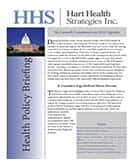Republicans Secure Majority in House for 119th Congress
November 20, 2024
Republicans Secure Majority in House for 119th Congress-Republicans have officially won enough seats to retain majority control of the House of Representatives for the 119th Congress. While five races remain uncalled, the balance of power currently stands at 218 seats for Republicans and 212 seats for Democrats. On the Senate side, Pennsylvania party officials are preparing for a recount in the race between Democratic incumbent Sen. Bob Casey and Republican challenger David McCormick. The state-mandated recount must begin by November 20, and Pennsylvania counties must submit their recount results by November 27.
Having secured majority control, the House GOP is now considering passage of a continuing resolution (CR) that extends government funding through March to provide President-elect Donald Trump with more control over fiscal year 2025 federal spending. This plan could allow Republicans to secure significant spending cuts but would put pressure on President Trump to avoid a government shutdown early in his administration. While House Republicans may favor a CR, the Democratic-controlled Senate would like to see an omnibus spending package.
Trump Taps RFK Jr. for HHS Secretary-President-elect Trump has named Robert F. Kennedy Jr. as his choice for Secretary of the U.S. Department of Health and Human Services. Kennedy is an environmental lawyer and well-known vaccine skeptic. He is a former Democrat who ran as an Independent in this year’s presidential race before dropping out and endorsing Donald Trump. Kennedy has recently spearheaded the ‘Make America Healthy Again’ movement, calling for a reform of pesticide, food additive, and vaccine regulations. Democrats are widely opposed to the selection, while many Republicans have not yet weighed in on the choice. The nomination will be voted upon by the Senate Finance Committee, but Kennedy will appear before both the Finance and Health, Education, Labor, and Pensions (HELP) Committees for confirmation hearings. Incoming HELP Chair Bill Cassidy, MD (R-La.) has acknowledged bipartisan support for Kennedy’s stance on food additives, while Finance Chair Mike Crapo (R-Idaho) has complimented Kennedy’s focus on chronic disease prevention. Kennedy’s position on vaccines, however, has largely drawn criticism from senators on both sides of the aisle, though some members-including Sens. Rand Paul, MD (R-Ky.) and Tommy Tuberville (R-Ala.)-have expressed support.
Trump Draws from Elected Officials for Other White House Positions – Amongst the other individuals tapped by Trump for Cabinet posts and administration jobs include several current members of Congress. President Trump has nominated Rep. Matt Gaetz (R-Fla.) as Attorney General. Gaetz resigned from Congress following Trump’s nomination announcement. The House Ethics Committee had been set to meet last week to vote on its report examining allegations of sex trafficking, acceptance of improper gifts, and illicit drug use by Gaetz, but lost jurisdiction over the former Congressman upon his resignation. While Ethics Committee Chair Michael Guest (R-Miss.) has indicated that he does not plan to allow the report to be released, Democrats on the panel are reportedly considering what avenues are available for them to release the information themselves. Gaetz’s nomination would be considered before the Judiciary Committee in the Senate. Current Judiciary Chair Dick Durbin (D-Ill.) was joined by a number of Senate Republicans-including Judiciary Committee member John Cornyn (R-Texas)-in pressing House Ethics to turn over the report. They have also expressed openness to subpoenaing the panel for the information. Rep. Mike Waltz (R-Fla.) is President Trump’s nominee for National Security Adviser. Florida Gov. Ron DeSantis (R) is acting quickly to schedule special elections to fill the two Florida seats. Former House Republican Conference Chair Elise Stefanik (R-N.Y.) has been nominated as U.N. Ambassador. Her confirmation would trigger a special election, which would likely take place sometime in the spring. The nomination of House members could temporarily impact Republican’s narrow majority in the chamber, though House Speaker Mike Johnson (R-La.) has stated that he does not expect Trump to select any additional House members for his administration. Trump also tapped Florida Sen. Marco Rubio (R) to serve as Secretary of State. DeSantis is responsible for appointing a replacement to fill Rubio’s seat until the next general election. Sen. Rick Scott (R-Fla.) has called on the Governor to appoint Lara Trump, current co-chair of the Republican National Committee, to replace Rubio in the Senate.
President-elect Pushes for Use of Recess Appointments-Donald Trump has repeatedly asserted his plans to use the president’s ability to make recess appointments to effectively bypass the normal Senate confirmation process for executive nominations. While recess appointments used to be common, a 2014 Supreme Court decision has since curbed its use. Neither President Trump during his first term nor President Biden made use of recess appointments. Recess appointments can be made while the Senate is adjourned for periods of two weeks or longer. Both chambers of Congress would need to pass a concurrent adjournment resolution-which can be done with simple majority votes-to put the Senate into a recess long enough to open the recess appointment window. While incoming Senate Majority Leader John Thune (R-S.D.) has expressed a preference for confirming presidential nominees “the regular way” he also stated that he remains open to the idea of recess appointments should Democrats block nominations through procedural means. There are more than 1,200 presidential appointments that require Senate confirmation. The last cabinet nomination to be formally rejected by the Senate was President George H.W. Bush’s defense secretary nominee John Tower, a former senator who faced allegations of alcohol abuse. Other nominees, such as Andrew Puzder-nominated for Secretary of Labor during Trump’s first term-have withdrawn their nomination before a formal vote. With an expected 53-47 seat majority, the Senate GOP can only afford to lose four Republicans in a nomination vote on the Senate floor.
Thune to Replace McConnell as Senate Republican Leader-Sen. John Thune (R-S.D.) was elected Republican Senate leader in a closed-door vote last week, beating Sens. John Cornyn (R-Texas) and Rick Scott (Fla.) to replace Sen. Mitch McConnell (R-Ky.). McConnell, who has led the Senate GOP for nearly 20 years, announced earlier this year that he would be stepping down from Senate leadership. Thune was first elected to the House of Representatives in 1996, where he served until being elected to the Senate in 2004. He has served as the Senate GOP whip, the second ranking Republican in the chamber, since 2019. During his time in Congress, Thune has been a champion of telehealth and pharmacy benefit manager reform. He is also a member of the bipartisan working group on Medicare physician payment reform, and opposes the Inflation Reduction Act’s Medicare drug price negotiation program. Starting in January, Thune will control the Senate’s procedures and schedule, and manage negotiations with Senate Democrats. Thune has stated that the Senate filibuster will stay intact during his leadership tenure. The incoming Senate majority leader has said that his priority will be confirmation of the President’s executive nominees, telling senators to expect “an aggressive schedule” until nominations are confirmed. The remaining results of Senate Republican leadership elections are as follows:
- Senate GOP Conference Chair John Barrasso, MD (R-Wy.) was elected the next Senate Majority Whip.
- Tom Cotton (R-Ark.) defeated Sen. Joni Ernst (R-Iowa) to replace Barrasso as Senate GOP Conference Chair.
- Shelley Moore Capito (R-W.Va.) was elected GOP Policy Committee Chair.
- James Lankford (R-Okla.) was elected GOP Conference Vice Chair.
- Tim Scott (R-S.C.) was elected Republican Senatorial Committee Chair.
Democrats have not yet held their leadership elections but are unlikely to see any major changes in rank.
Cassidy to Chair HELP in the 119th Congress-Sen. Bill Cassidy, MD (R-La.) will lead the Senate Health, Education, Labor, and Pensions (HELP) Committee next Congress. Sen. Rand Paul, MD (R-Ky.), who has seniority on the panel, announced that he will take the helm of the Senate Homeland Security and Governmental Affairs Committee (HSGAC) instead. As HSGAC chair, Paul has stated his intent to build upon the panel’s biosecurity-related investigations. Sen. Cassidy, a gastroenterologist/hepatologist, will be the first medical doctor to serve as HELP chair since 1933. During his time as HELP Ranking Member during the 118th Congress, Cassidy has worked with members on both sides of the aisle to lower the cost of health care and reform the pharmacy benefit manager industry. He also released an NIH white paper, and earlier this month released a bipartisan legislative framework for site neutral payment reform with Sen. Maggie Hassan (D-N.H.).
House Republican Leadership Elections-Republicans in the House of Representatives unanimously nominated Mike Johnson (R-La.) to continue to serve as House Speaker. While Johnson only needed the support of a simple majority of his conference to become the party’s nominee, he will need a majority of the full House in January to secure the speakership. The speaker election is slated for January 3. Majority Leader Steve Scalise (R-La.) and Majority Whip Tom Emmer (R-Minn.) will continue to serve in their positions during the 119th Congress. The remaining results of the House Republican leadership elections are as follows:
- Lisa McClain (R-Mich.) defeated Rep. Kat Cammack (R-Fla.) for the position of Republican Conference Chair.
- Erin Houchin (R-Ind.) was selected to replace McClain as GOP Conference Secretary.
- Richard Hudson (R-N.C.) won a second term as National Republican Congressional Committee Chair.
- Oklahoma Rep. Kevin Hern (R-Okla.) defeated Rep. Gary Palmer (R-Ala.) in the race for Policy Committee Chair.
The House Republican Steering Committee had planned to meet to decide contested races for committee chairmanships in the 119th Congress, including the Energy and Commerce Committee, but the meeting was rescheduled. House Democrats will hold their leadership elections on November 19th and 20th.
Freshmen members of Congress have also been on the Hill in recent days for new member orientation. The Republican freshman class selected Rep.-elect Brandon Gill (R-Texas) to serve as the freshman class president. Gill is a former investment banker who will fill the seat of retiring Rep. Michael Burgess, MD (R-Texas) next Congress.
GOP Doctors Caucus Announces Co-Chairs for the 119th Congress-The House GOP Doctors Caucus has elected Rep. John Joyce, MD (R-Pa.), a dermatologist, to serve as co-chair alongside Rep. Greg Murphy, MD (R-N.C.), a urologist, for the 119th Congress. “Our country faces many great challenges, and now more than ever, we need thoughtful solutions to expand access to affordable, high-quality care,” Joyce and Murphy said in a statement. “With a majority in the House of Representatives, we look forward to working with President Trump and the Republican Conference as we consider much-needed reforms.”
Gottheimer to Run for NJ Governor-Rep. Josh Gottheimer (D-N.J.) announced his bid for governor of New Jersey last week. Gottheimer, who just won reelection to the House of Representatives, will run to succeed term-limited Governor Phil Murphy (D) in November 2025. He joins a field of at least four other Democrats and four Republicans vying for the position.
E&C Republicans Ask GAO to Assess Structure of Lab Safety Offices-House Energy and Commerce Committee Republicans are asking the Government Accountability Office (GAO) to examine laboratory safety programs at the Centers for Disease Control and Prevention (CDC), Food and Drug Administration (FDA), and National Institutes of Health. “This committee remains concerned about the effectiveness of the oversight the U.S. Department of Health and Human Services and its agencies provide to the laboratories they own and operate,” the letter states. “In addition to numerous GAO recommendations that remain unimplemented by the FDA, both the CDC and the FDA recently announced organizational reforms to their laboratory safety and security functions, and it is not clear whether these changes will strengthen oversight or create new undue risk.” The letter was signed by Committee Chair Cathy McMorris Rodgers (R-Wash.), Health Subcommittee Chair Brett Guthrie (R-Ky.), and Oversight and Investigations Subcommittee Chair Morgan Griffith (R-Va.).
DEA Extends COVID-Era Telehealth Flexibilities-On Friday, the Drug Enforcement Administration (DEA) released a temporary rule titled “Third Temporary Extension of COVID-19 Telemedicine Flexibilities for Prescription of Controlled Medications.” This regulation extends, through December 31, 2025, the pandemic-era telemedicine flexibilities that have been in place since March 2020 for prescribing controlled medications via the practice of telemedicine. The flexibilities allow Schedule II-V substances to be prescribed without an in-person visit. The final rule extends regulations with no substantive changes to the current rules. DEA previously received a record 38,000 comments after proposing to rein in the flexibilities due to concerns about overprescribing and substance misuse. The agency states that its latest decision will provide more time to finalize regulations that both mitigate the risk of diversion while also avoiding disruptions in access to care.
GAO Outlines Ongoing Cybersecurity Challenges at HHS-The Government Accountability Office (GAO) has released a new report outlining the steps the U.S. Department of Health and Human Services (HHS) could take to address the increasing number of cyberattacks against health care organizations. The report highlights that HHS has failed to implement past GAO recommendations related to supporting health care cyber risk management, assessing sector cybersecurity risks, and coordinating and collaborating for sector cybersecurity. The full GAO report can be found here.
CBO Releases FY 2024 Budget Review Summary-The federal budget deficit increased eight percent, or $138 billion, according to the Congressional Budget Office’s (CBO) budget review summary for fiscal year (FY) 2024. CBO found that Medicare outlays rose by nine percent, or $78 billion, because of higher enrollment and health care service payment rates. Medicaid outlays rose less than one percent, or $2 billion. While state Medicaid programs disenrolled millions of individuals in FY 2024, per-person Medicaid enrollee costs increased since FY 2023.
Upcoming Congressional Hearings and Meetings
House Appropriations Subcommittee on Labor, Health and Human Services, Education, and Related Agencies hearing on the National Institutes of Health; 10:00 a.m.; November 19
House Appropriations Committee oversight hearing “Assessing the Veterans Health Administration Fiscal Year 2025 Potential Shortfall;” 10:00 a.m.; November 20
House Foreign Affairs Subcommittee on Global Health, Global Human Rights, and International Organizations hearing “Meeting the Challenges of Global Brain Health: Diagnosis and Treatment for the 21st Century;” 2:00 p.m.; November 20
House Veterans’ Affairs Subcommittee on Health hearing “Life After Limb Loss: Examining VA Amputee Prosthetics Care;” 2:30 p.m.; November 20
Recently Introduced Health Legislation
H.R.10106-To require the Secretary of Veterans Affairs to enter into a contract or other agreement with a third party to review appointees in the Veterans Health Administration who had a license terminated for cause by a State licensing board for care or services rendered at a non-Veterans Health Administration facility and to provide individuals treated by such an appointee with notice if it is determined that an episode of care or services that they received was below the standard of care, and for other purposes; Sponsor: Norman, Ralph [Rep.-R-SC-5]; Committees: House-Veterans’ Affairs
S.5297-A bill to amend the Internal Revenue Code of 1986 to increase the limitations on contributions to health savings accounts, and for other purposes; Sponsor: Paul, Rand [Sen.-R-KY]; Committees: Senate-Finance
S.5298-A bill to amend the Employee Retirement Income Security Act of 1974 to allow health marketplace pools to be deemed an employer under section 3(5) of such Act for purposes of offering a group health plan or group health insurance coverage, and for other purposes; Sponsor: Paul, Rand [Sen.-R-KY]; Committees: Senate-Health, Education, Labor, and Pensions
H.Res.1569-Expressing support for the designation of the week beginning on November 11, 2024, as “National School Psychology Week”; Sponsor: Fitzpatrick, Brian K. [Rep.-R-PA-1]; Committees: House-Education and the Workforce
S.5308-A bill to amend title XVIII of the Social Security Act to reauthorize the Rural Flex program, and for other purposes; Sponsor: Hassan, Margaret Wood [Sen.-D-NH]; Committees: Senate-Finance
S.5311-A bill to require the public release of all research supported by the National Institutes of Health; Sponsor: Kennedy, John [Sen.-R-LA]; Committees: Senate-Health, Education, Labor, and Pensions
H.J.Res.220-Providing for congressional disapproval under chapter 8 of title 5, United States Code, of the rule submitted by the Bureau of Consumer Financial Protection relating to “Debt Collection Practices (Regulation F); Deceptive and Unfair Collection of Medical Debt”; Sponsor: Palmer, Gary J. [Rep.-R-AL-6]; Committees: House-Financial Services
S.5326-A bill to fully fund the Prevention and Public Health Fund and reaffirm the importance of prevention in the United States healthcare system; Sponsor: Blumenthal, Richard [Sen.-D-CT]; Committees: Senate-Health, Education, Labor, and Pensions
S.5330-A bill to direct the Secretary of Defense to establish a pilot program regarding treating pregnancy as a qualifying event for enrollment in TRICARE Select; Sponsor: Duckworth, Tammy [Sen.-D-IL]; Committees: Senate-Armed Services
H.R.10124-To direct the Secretary of Agriculture to establish and administer a pilot program to provide grants to support Food is Medicine programs, and for other purposes; Sponsor: Kelly, Robin L. [Rep.-D-IL-2]; Committees: House-Agriculture; Energy and Commerce
H.R.10126-To fully fund the Prevention and Public Health Fund and reaffirm the importance of prevention in the United States healthcare system; Sponsor: Matsui, Doris O. [Rep.-D-CA-7]; Committees: House-Energy and Commerce

Hart Health Strategies provides a comprehensive newsletter on a weekly basis that recaps the previous week and previews the week ahead.

Health on the Hill provides current happenings in health care within the Federal Government and on Capitol Hill.















